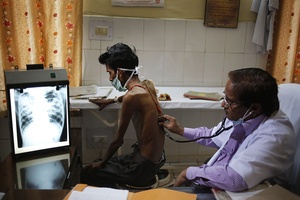Inside India: The deadly effects of red tape
Red tape and over-regulation can kill.
As Prime Minister Narendra Modi fights to loosen bureaucrats’ stifling grip on the economy, he also needs to ease Indians’ access to life-saving drugs.
India for years has struggled to contain an epidemic of tuberculosis –especially the drug-resistant strains of this deadly and contagious disease.
New and effective drugs that can cure even the most impervious forms of TB are available – and approved for use in the U.S. and Europe.
You’d think India’s public-health authorities would be banging down the doors of the companies that make these medicines to get them for India’s desperate patients. Instead, they are throwing up road blocks.
Take the case of bedaquiline, which was approved in 2012 by the U.S. Food and Drug Administration, known for its rigor in assessing the safety and efficacy.
In May of 2013, a Johnson & Johnson company asked Indian drug regulators for permission to sell the drug. The application was not approved by a review committee, citing a requirement for a clinical trial here, which had not been done.
Bedaquiline is still going through large-scale clinical trials. But because of the urgent need for the drug, U.S. and other regulators approved it based on smaller studies.
America – where about 10,000 cases of TB are reported each year — thinks it needs bedaquiline. India has an estimated 2.1 million cases each year, including about 100,000 drug-resistant ones.
Japan’s Otsuka Pharmaceutical Co. Ltd., which makes another new anti-TB drug, delamanid, hasn’t approached Indian regulators, even though the European Medicines Agency, a strict reviewer of new medicines, cleared it for use last year.
Otsuka plans to approach India soon, a spokesman said. The company wanted European or U.S. approval first, he said, because their regulatory processes are rigorous and obtaining approval from one of them is a requirement in many countries with less experience. Eastern Europe has a major problem with drug resistant TB, so Otsuka went for European approval first.
The company’s experience with India the last time around was discouraging, the spokesman said. Otsuka approached Indian regulators in early 2012, seeking to recruit patients for its global clinical trial of delaminid. The company was told clinical trials were on hold, and, after waiting one-and-a-half years, gave up in September of 2013 and recruited patients elsewhere.
After months of protest from doctors and health advocates, Indian regulatory authorities earlier this month decided to waive their requirement of local clinical trials for bedaquiline so it can be used on extremely sick patients in the government’s TB program.
But regulators stopped short of allowing physicians in private practice – who treat the vast majority of Indians — to prescribe the medicine.
Jagdish Prasad, the director general of health services at India’s Health Ministry, said private physicians “misuse” TB drugs, prescribing them wrongly. If these doctors have TB patients in need of bedaquiline, “they can send them to the government program to get the drug,” he said.
“Preventing the misuse of drugs by limiting access isn’t a good idea when people are dying,” says Jennifer Furin, a U.S. physician who works with the World Health Organization on TB treatment. “This is the time to be creative.”
Zarir Udwadia, a private physician in Mumbai, has managed to obtain the drug from the manufacturer under a compassionate-use program for some of his sickest patients.
Dr. Udwadia published a paper in medical journal last year showing dramatic results for his first five patients to receive the drug.
Among them was Prathamesh Balgi, a 33-year-old bank manager, who had 40% of his lungs surgically removed in an unsuccessful effort to rid him of TB. After a year of treatment with bedaquiline, however, he is now cured.
Mr. Balgi is happy, but wishes he got the new drug sooner, “before so much of my lungs were removed, I could have saved my lungs.” Every other patient with drug resistant TB should get “this miracle tablet,” he says.
Patients like Mr. Balgis shouldn’t be losing their lungs – and their lives — when medical breakthroughs available abroad can restore them to health. We need to remove the bureaucratic hurdles that keep India’s most vulnerable from getting the care they need.
“For infectious diseases where people are dying and existing treatment options are intolerable and failing, faster action rather than more delays are what’s needed,” says Soumya Swaminathan, director of the National Institute for Research in Tuberculosis.
Source: The Wall Street Journal


